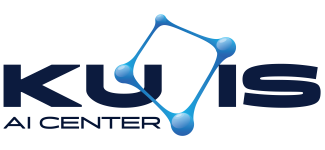
Emre Can Açıkgöz, MSc student in Computer Science and Engineering
Can you briefly introduce yourself and share your background in AI research?
I am a second year MSc student at Computer Science department and a fellow at KUIS AI Center. My research is in natural language processing (NLP) and multimodal learning around Large Language Models (LLMs). I am mentored by Prof. Deniz Yuret and Prof. Aykut Erdem. Prior to my MSc, I received my BSc again from Koc University but in Electrical and Electronics Engineering (AI focus), where I worked under the supervision of Prof. Deniz Yuret on supervised and unsupervised morphological analysis.
What initially sparked your interest in the field of AI? Was there a particular moment or experience that inspired you to pursue this area of study?
Since my undergraduate years, I have been curious about the concept of Deep Learning, particularly intrigued by the notion of how a machine can “learn” on its own and how to “build” these with computers. In one of his office hours, Prof. Alper Erdoğan told me about some online materials about Deep Learning and kindly asked me to check for these. Then, in the upcoming semester, Prof. Aykut Erdem came to our university and opened the Comp547: Deep Unsupervised Learning course for the first time. I asked professor to see if he can let me enroll to the course, since I was just a sophomore without any background. Taking that course made me addicted to all that amazing stuff and Prof. Aykut Erdem really helped me during that time to catch up. Next semester, I met with Prof. Deniz Yuret and we started working on morphology with Transformers and rest is as one can see… In that point, special thanks to our Professors again; without their touches, the person I’ve achieved and the knowledge I gained today would not be possible.
Could you tell us about your current research or thesis topic in AI? What motivated you to choose this specific area?
I focus on exploring the capabilities of LLMs and extend them to new tasks or domains. This not restricted only with the text modality, but also vision and action data representations which is necessary for building general artificial foundational models. My interest for LLMs starts from my undergraduate years, where we worked on unsupervised morphological tasks with LLMs and adapters. We recognized the promise and potential of these models for the near future and believed that beginning to train them for various tasks would be an ideal way to learn about and familiarize ourselves with them.
How do you balance your academic workload, personal life, and the demands of your AI research? Do you have any strategies or tips that have helped you maintain a healthy work-life balance?
I go to gym everyday for 20 minutes which helps me to clear all the brain noise in my mind and make me like a newborn. In my free times, I like to spend time with my family.
What excites you the most about the potential applications of AI in the real world? Are there any specific domains or industries where you believe AI can make a significant impact?
I am genuinely excited about the potential of foundational models and LLMs in our daily lives. ChatGPT is the most successful product of AI, and I anticipate the emergence of another groundbreaking model in Medical AI, like an assistant for doctors. However, I believe that the next revolutionary leap will be in embodied foundational models with robots, encompassing human-robot interaction.
What advice would you give to aspiring students who are interested in pursuing a career in AI and considering graduate studies?
Regarding thay, I’d like to emphasize one point that I find seriously crucial. During your journey, you will face with a lot of ups and downs (mostly downs, with a ratio of ~0.8). At middle of these downs, there will be some points that you’ll regularly avoid, either due to the demanding workload or the perceived difficulty of the task. However, in these situations, remember that “the magic you are looking for is in the work you are avoiding”. As humans, our awareness is heightened, yet we are susceptible to procrastination. Therefore, always embark on the work with patience and consistency. Beside the research, learning how to learn is another essential skill that we should master during our journey.
A book and movie that you recommend (they don’t have to be related to ai)
Actually I am a Star Wars geek but this time I would like to recommend “Transformers: The Dark Side of the Moon” and “Pirates of the Caribbean: At World’s End”. For book, I generally read about neuroscience and applied mathematics; I would like to say David Eagleman, “The Brain”.
